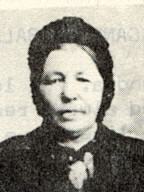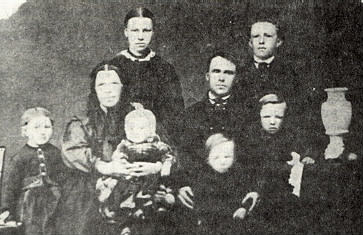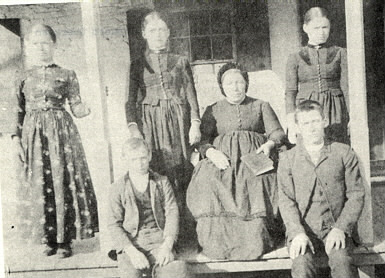
Aganetha Balzer
Married Name:
Aganetha Balzer Duerksen

Born: October 24, 1837
Place: Alexanderwohl, Russia
Died: April 18, 1903
Place: Hillsboro, Kansas

MOTHER:
Helena Schroeder (1816 - Unknown)
FATHER:
Heinrich Balzer, II (1810 - Unknown)
SIBLINGS:
Siblings Unknown

SPOUSE:
Johann Duerksen
Married: June 4, 1857
Place: South Russia
CHILDREN:
Maria B. Duerksen
Johann J. Duerksen
Heinrich J. Duerksen
Helena B. Duerksen
Peter J. Duerksen
Katherina B. Duerksen
Jacob J. Duerksen ( 1/16/1867-1/25/1867)
Cornelius B. Duerksen
Aganetha Duerksen
Gerhard J. Duerksen
Eva B. Duerksen
Anna B. Duerksen
Susanna B. Duerksen
David B. Duerksen
Widowed: April 27, 1891

SPOUSE:
Jacob Krause (1/6/1836 - 7/31/1921)
Married: February 9, 1892
Place: Marion County, Kansas
No children were born to this marriage

JOHANN and AGANETHA (BALZER) DUERKSEN
Written by Grandson Jacob A. Duerksen
At the age of 24, Johann married Aganetha Balzer from Alexanderwohl, the oldest daughter of Heinrich Baltzers, who were also members of the Rudnerweide Church. The young couple settled in Alexanderthal also, where their 4 oldest children were born. In 1862 they moved 10 miles northwest to the village Gnadenthal where the 10 younger children were born. While living in Gnadenthal, according to tradition, they worshipped in the Margenau Church. In late spring of 1878, the Johann Duerksens with their family of 13 children and their parents, Heinrich Baltzers, left Russia for the United States. They crossed the Atlantic Ocean on the German steamship “Strassburg” from Bremen to New York, arriving on July 2 in New York, and July 4th at Peabody, Kansas.
(Left to Right) Back Row: Maria and Johann
Front Row: Daughter Aganetha, Aganetha, Eva, Husband Johann, Gerhard, Cornelius

The grandparents Duerksens settled on the southwest quarter of Section 18 in Liberty Township, Marion County, Kansas. Grandfather bought this farm for $8.00 an acre from a Mr. Kreis, who lived in a sod house. In the early years the land was mostly tilled with oxen, later giving way to horses. The horse-drawn steam engine was used for many years for threshing the grains. Their best corn crop in the early years yielded 90 bushels to the acre. Grandfather was known as a frugal farmer, accumulating several sections of land before he died, so that each child inherited about 120 acres.
Three serious misfortunes befell the Johann Duerksen family within the short span of six years. In the summer of 1885 while the men-folk and some of the older girls were harvesting wheat on a distant field, lightening struck their family home with the result that the house and barn with furniture and equipment burned down. Practically nothing was saved.
Four years later, in 1889, a severe horse epidemic struck this part of Kansas, locally known as “Stampa” or “Distemper”, but according to a veterinarian was probably the dreaded “Strangles”. The county inspector condemned 5 of grandfather’s horses to be shot. About a month later when there was no sign of illness left among the horses, the sheriff shot the five horses.
Then in spring of 1891, at the age of 55, grandfather died very suddenly of a heart attack at the supper table.
In Kansas, the grandparents joined the (Flemish) Alexanderwohl Church, where several of grandmother’s sisters, one brother’s family and the Grandfather’s brother Heinrich had joined several years earlier.
Grandfather had either no schooling or only very little for he could not read nor write when they were married. Grandmother taught him to read after they were married.
In 1892 Grandmother was married for the second time, when she became the wife of Jacob Krause. They continued to live on the Duerksen farm until 1903 when Grandmother passed away rather suddenly.
Susanna, David B., Eva, Aganetha, Gerhard J., Anna


A TRIBUTE TO GRANDMOTHER AGANETHA BALZER DUERKSEN
Written by Grandson Edward Duerksen
Grandma Duerksen was a wonderful grandma. We loved to go to her house for a visit. She was quite heavy set and always ready to keep us company when we came to her house. Grandparents lived in a long Russian style house with the barn, instead of the garage, attached to the north end of the house. Grandma kept the house very neat, she loved to work in the house and yard.
She always had a word of instruction for us children, which sometimes was rather humiliating. We loved to reach into the deep side pocket of her dress for something good to eat, for she usually had something in her pocket. One time, I shall never forget, I became somewhat bold and said, “Hast Du eene Kock fa me”? Whereupon she replied, “Je Kinga motta emma See saga to olle Lied.” (This is an instruction to always use the polite form to older people). I have never forgotten that, and am sure always used “See” after that; even to this day I respect older people. I always felt very close to Grandma, she always was an inspiration to me. I am sorry that I have not remembered more things about her life. We loved to eat lunch with the grandparents on Christmas Day and recite our Christmas pieces for a small sack of peanuts and a cookie.
The night before she died, coming home from the doctor with Grandpa Krause, her second husband, she said to me, “Everything smells so different.” I think the doctor had told her that she was very sick; she had dropsy. That night she when home to be with her Lord.
After her death I missed her and often think of her as a dear Christian grandmother who was much interested in teaching us short Bible verses and the following table prayer: “Komm Herr Jesus sei unser Gast, und segne was Du uns bescheret hast. Amen.”
She raised a large family of which all children but one have left to meet her in Glory. She was a very peaceful and contented woman. May the Lord give us more grandmothers like her.















